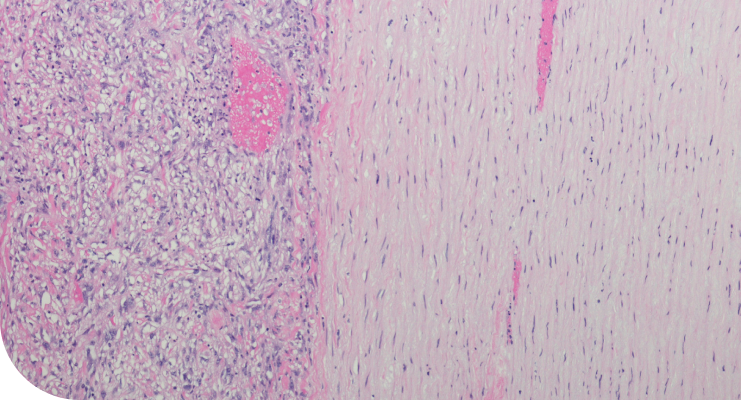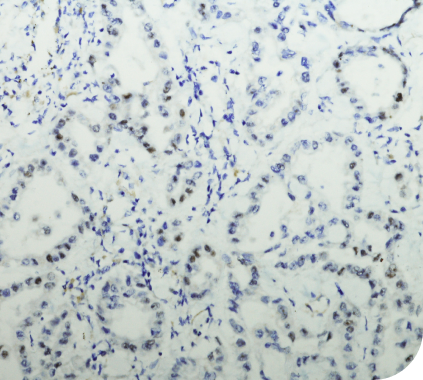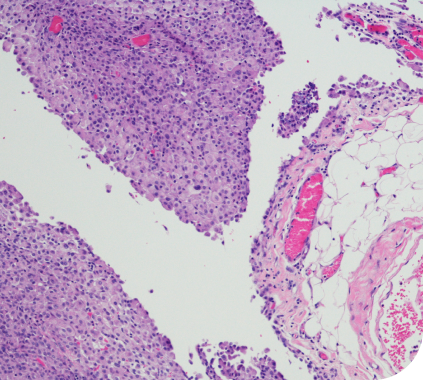Sarcomatoid Mesothelioma
Sarcomatoid mesothelioma is a rare cell type of mesothelioma with a grim prognosis. It is characterized by spindle-shaped cells that easily pull apart from each other. This allows the cells to quickly metastasize, or spread to distant points throughout the body, and makes it difficult to remove them through surgery. They are also more resistant to systemic treatments compared to other cell types.
Home » National Mesothelioma Law Firm » Mesothelioma Cancer » Mesothelioma Cell Types » Sarcomatoid Mesothelioma

Medically Reviewed By:
Patricia Shelton, M.D.
- Page Last Updated:
- April 24, 2024
Medically Reviewed By:Patricia Shelton, M.D.
- Page Last Updated:
- April 24, 2024
Sarcomatoid mesothelioma is the most aggressive type of malignant mesothelioma, which is a rare cancer that affects the membranes surrounding the lungs or abdominal organs.
Mesothelioma is classified into three primary cell types: epithelial, sarcomatoid, and biphasic. Although it’s the most aggressive type, sarcomatoid mesothelioma is also the rarest cell type, accounting for just 10 percent of all cases of mesothelioma.
What is sarcomatoid mesothelioma?
Sarcomatoid mesothelioma is characterized by cancer cells that are shaped like spindles, making them unlikely to stick together, according to Moffitt Cancer Center. As a result, the cells tend to break away from each other, which makes it easy for them to metastasize to distant parts of the body.
Because of this tendency to spread, survival rates are lower for sarcomatoid mesothelioma than for other cell types. The overall survival for patients with this cell type is 3.5 to 8 months, with most peritoneal sarcomatoid mesothelioma patients dying within four to five months.
Sarcomatoid mesothelioma is a more common cell type of pleural mesothelioma, which arises from the membrane surrounding the lungs. The sarcomatoid cell type accounts for approximately 20 percent of pleural mesothelioma cases. In peritoneal mesothelioma, which arises from the membrane surrounding the digestive tract, it’s much rarer. It occurs in approximately 0.5 percent of peritoneal mesothelioma cases, according to Human Pathology: Case Reports.

Distant Metastasis
Metastasis is the term used to describe the spread of cancer from one part of the body to another. Cancer cells can spread to the lymph nodes, lungs, liver, adrenal glands, and kidneys. The Colchester Hospital University Foundation Trust has also reported rare cases of sarcomatoid mesothelioma metastasizing to the bones or central nervous system (the brain and spinal cord).
Sarcomatoid Subtypes
There are a few possible subtypes of sarcomatoid mesothelioma. Not all cases of sarcomatoid mesothelioma belong to one of these groups; many are simply classified as sarcomatoid mesothelioma of no particular subtype. However, in some cases, sarcomatoid mesothelioma may be further classified into one of these subtypes.
Desmoplastic Mesothelioma
Desmoplastic sarcomatoid mesothelioma is characterized by areas of dense fibers of collagen (a structural protein), separated by irregular cells found in a storiform pattern, which is a pinwheel-like arrangement. It’s relatively uncommon, comprising five to 10 percent of malignant pleural mesothelioma cases. This subtype is associated with an especially poor prognosis. A study published in BMC Cancer found a median overall survival of 3.8 months.
Sarcomatoid mesothelioma is classified as desmoplastic mesothelioma when the desmoplastic pattern is found in at least 50 percent of the tumor tissue. This type can be confused with a non-cancerous disease known as fibrous pleuritis.
Lymphohistiocytoid Mesothelioma
Lymphohistiocytoid mesothelioma is a rare variant of sarcomatoid mesothelioma that contains lymphocytes, a type of white blood cell. This sarcomatoid variant is associated with a better prognosis than other sarcomatoid subtypes. Outcomes are more similar to those usually found in epithelioid mesothelioma than in sarcomatoid mesothelioma, with a median survival of 32 to 40 months, according to a study published in the American Journal of Surgical Pathology.
Heterologous Mesothelioma
In exceptionally rare cases, sarcomatoid mesothelioma cells may show certain features characteristic of the rare forms of cancer that begin in bone or soft tissue, including osteosarcoma, chondrosarcoma, or a mixture thereof. This is known as heterologous mesothelioma.
What causes sarcomatoid mesothelioma?
The primary cause of sarcomatoid mesothelioma is asbestos exposure. Asbestos is a group of minerals that were used across various industries for decades. There are two families of asbestos, known as serpentine and amphibole.
Chrysotile asbestos is the sole type in the serpentine family. This form is considered less likely to cause disease than the other types of asbestos and is the most common form, used in approximately 95 percent of asbestos products.
The most prevalent forms of amphibole asbestos used commercially are amosite and crocidolite. The three other amphiboles, which include tremolite, actinolite, and anthophyllite, have typically occurred as contaminants in other minerals sold commercially, including talc and vermiculite.
The causative link between mesothelioma and all forms of asbestos is well-established. There is no conclusive evidence that any specific type of asbestos can be linked to a specific cell type of mesothelioma.
However, a study published in the Journal of Thoracic Oncology shows a possible link between commercial amphiboles and the sarcomatoid cell type. Additionally, Modern Pathology reports a finding of higher concentrations of commercial amphiboles in the sarcomatoid type of tumors. This suggests that being exposed to amphibole asbestos may increase the risk of developing sarcomatoid mesothelioma, although more research is needed to be sure.
Diagnosing Sarcomatoid Mesothelioma
Mesothelioma is an exceedingly rare form of cancer, accounting for only 0.17 percent of all cancer cases. Due to its rarity, few practitioners have experience in diagnosing mesothelioma, and the result is that a practitioner may not think to check for this condition. Complicating the situation, the symptoms are generally non-specific, meaning that the same symptoms can be caused by many other diseases. These factors can result in a misdiagnosis.
Symptoms
Mesothelioma symptoms often do not emerge until after the condition is already in its later stages, which adversely impacts the prognosis. When symptoms do emerge, they tend to mimic more common, less serious conditions.
Pleural Mesothelioma
Sarcomatoid pleural mesothelioma impacts the lining around the lungs. Symptoms may include the following:
- Especially persistent coughing, including coughing up blood
- Severe shortness of breath
- Hoarseness
- Unexplained weight loss
- Decreased appetite with feelings of fullness
- Nausea and vomiting
- Fatigue and weakness

Peritoneal Mesothelioma
Peritoneal mesothelioma impacts the lining around the stomach and may present with the following, according to the American Society of Clinical Oncology:
- Increased abdominal size
- Abdominal pain or discomfort
- Unexplained weight loss
- An umbilical or inguinal hernia
- Fever
- Night sweats
- Fatigue
- Nausea and vomiting
- Constipation
- Loss of appetite
- Excessive platelet count (found on a blood test)

Conditions that Mimic Sarcomatoid Mesothelioma
- Malignant solitary fibrous tumor
- Various sarcomas
- Differentiated müllerian gynecological carcinoma
Desmoplastic mesothelioma can be confused with the following:
- Fibrous pleuritis
- Reactive mesothelial hyperplasia
- Hodgkin or non-Hodgkin lymphoma
- Lymphoepithelial cancer
- Sarcomatoid lung cancer
- Thymoma
- Reactive lymphoproliferative lesions
- Inflammatory pseudotumor
- Ganglioneuroma
Diagnostic Tests
Due to the difficulties in accurately diagnosing sarcomatoid mesothelioma, it is usually necessary for practitioners to utilize more than one testing modality to determine the correct diagnosis. An accurate diagnosis generally requires using a combination of imaging and surgical techniques.
Diagnostic tests that may be used for sarcomatoid mesothelioma include imaging and biopsies.
Imaging Tests
- Chest X-rays
- Computed Tomography Scans (CT scans)
- MRI
- Positron Emission Tomography (PET scan)
- Ultrasound

Biopsies (tissue samples)
- Fluid biopsies
- Endoscopic biopsy
- Thoracoscopy
- Mediastinoscopy
- Laparoscopy
- Open surgical biopsy
Experts note that ultrasound, CT-guided biopsy, and thoracoscopic and surgical biopsy techniques should be used together to increase the accuracy of the diagnosis.
Treatment for the Sarcomatoid Cell Type
In general, sarcomatoid mesothelioma is more resistant to treatment than the other cell types, leaving patients with fewer treatment options.
Surgery
While tumor-removing surgery may be an option for patients with other cell types, patients with sarcomatoid tumors are not considered candidates for surgery. Studies have not shown that surgery offers a survival benefit in these patients.
This may be the case for a few different reasons. The spindle-shaped cancer cells tend to break apart from each other, which can make it harder to completely remove the tumor.
In addition, because sarcomatoid cells spread throughout the body so easily, they have often already spread when the cancer is diagnosed, even if no distant metastasis is obvious yet. These factors make surgery a poor option for patients with this cell type.
Instead, a systemic treatment approach is typically utilized. However, the sarcomatoid cell type is also less responsive to systemic treatment modalities.
Chemotherapy
The first-line treatment approach for sarcomatoid mesothelioma is chemotherapy. The standard mesothelioma chemotherapy regimen doctors use involves pemetrexed combined with either cisplatin or carboplatin.
However, sarcomatoid mesothelioma cells often do not respond to chemotherapy. A study published by the European Respiratory Review in 2021 found that only 22 percent of sarcomatoid pleural mesothelioma patients responded to the pemetrexed and cisplatin combination.
Some studies have found that the addition of the antivascular drug bevacizumab may be linked to better outcomes. Antivascular drugs inhibit the growth of new blood vessels, which makes it harder for the tumor to get energy and grow.
Research is continuing to develop new chemotherapy drugs. Phase II studies of the chemotherapy drug vinorelbine have shown clinical efficacy in all three cell types. Another study of patients with sarcomatoid mesothelioma who received the chemotherapy drug lurbinectedin showed no difference in prognosis from the other cell types. These results indicate that more effective chemotherapy for sarcomatoid mesothelioma may be available in the future.
In addition, the specialists in the UCLA comprehensive mesothelioma program have obtained favorable results by using chemotherapy drugs traditionally used for sarcoma in other parts of the body instead of the chemotherapy drugs typically used for mesothelioma.
Immunotherapy
Immunotherapy is a form of treatment designed to stimulate the patient’s immune system to attack the cancer cells. Australian researchers have found that a type of immunotherapy agents known as immune checkpoint inhibitors (ICIs) have shown promising results as a potential first-line treatment for sarcomatoid mesothelioma.
Sarcomatoid patients are often left out of clinical trials because of the aggressive nature of this cell type. However, in one study reported by the American Society of Clinical Oncology (ASCO), sarcomatoid mesothelioma patients who received immunotherapy actually responded better than those with the epithelioid cell type. These patients were given the immunotherapy drugs nivolumab and ipilimumab (currently sold under the brand names Opdivo and Yervoy).
Immunotherapy is currently FDA-approved for use in pleural mesothelioma patients who are not eligible for surgery, which includes those with the sarcomatoid cell type.
TTFields
Tumor-treating fields, sometimes known as TTFields or TTF, is a medical device that’s also available for use in mesothelioma patients who are not candidates for surgery, including patients with sarcomatoid mesothelioma. The device delivers a low-intensity electrical current to the area around the tumor. It’s often used along with chemotherapy, and leads to an increase in median survival from 12 to 18 months with virtually no side effects. The anti-tumor mechanisms are still being studied, as they are poorly understood.
Palliative Care for Sarcomatoid Mesothelioma
Palliative care is a form of medical care that focuses on comfort management and symptom relief, including the management of side effects caused by surgery and systemic therapy. According to the ASCO, palliative treatment may include the following:
- Medication
- Nutritional support
- Relaxation techniques
- Emotional support
- Spiritual support
Palliative care may also include the same treatments that are typically used for therapeutic purposes, including chemotherapy, surgery, and radiation therapy to shrink tumors and relieve symptoms. The difference is that, with palliative care, the intent is to increase the patient’s comfort rather than to eliminate the cancer.

How to Find a Mesothelioma Doctor
When choosing a physician, it is important to select a doctor who specializes in mesothelioma. Mesothelioma is a rare cancer in general, and the sarcomatoid type is particularly rare. Few general oncologists have experience treating this type of cancer.
Mesothelioma impacts the mesothelium, the lining around the internal organs. This lining is thin and lacks a blood supply, making it much more difficult to treat. If the techniques used for other cancers are applied to mesothelioma patients, they are unlikely to be effective. Sarcomatoid mesothelioma is the least responsive, making the involvement of a specialist all the more critical.
Is there any hope for patients with sarcomatoid mesothelioma?
Mesothelioma patients afflicted by the sarcomatoid cell types face the worst prognosis, due to this cell type’s propensity toward distant metastasis and resistance to treatment. However, modern medicine is advancing at a rapid pace, and mesothelioma clinical trials continually uncover more effective treatments.
While there is currently no cure for mesothelioma, the strong interest in this subject by brilliant, passionate researchers lends hope that there will one day be a cure. One of the advantages of seeking treatment through a specialized treatment center is that many mesothelioma treatment centers participate in clinical trials.
According to Translational Lung Cancer Research, numerous clinical trials are underway that focus on adding agents to established chemotherapy regimens that may increase its efficacy. These include the following:
- Antivascular therapy
- Targeted therapy
- Immunotherapy
Therapeutic benefits of the addition of these agents have already been discovered, but they are still being fine-tuned to increase their effectiveness and maximize survival.

By submitting this form, you agree to our terms & conditions. Please read the full disclaimer



